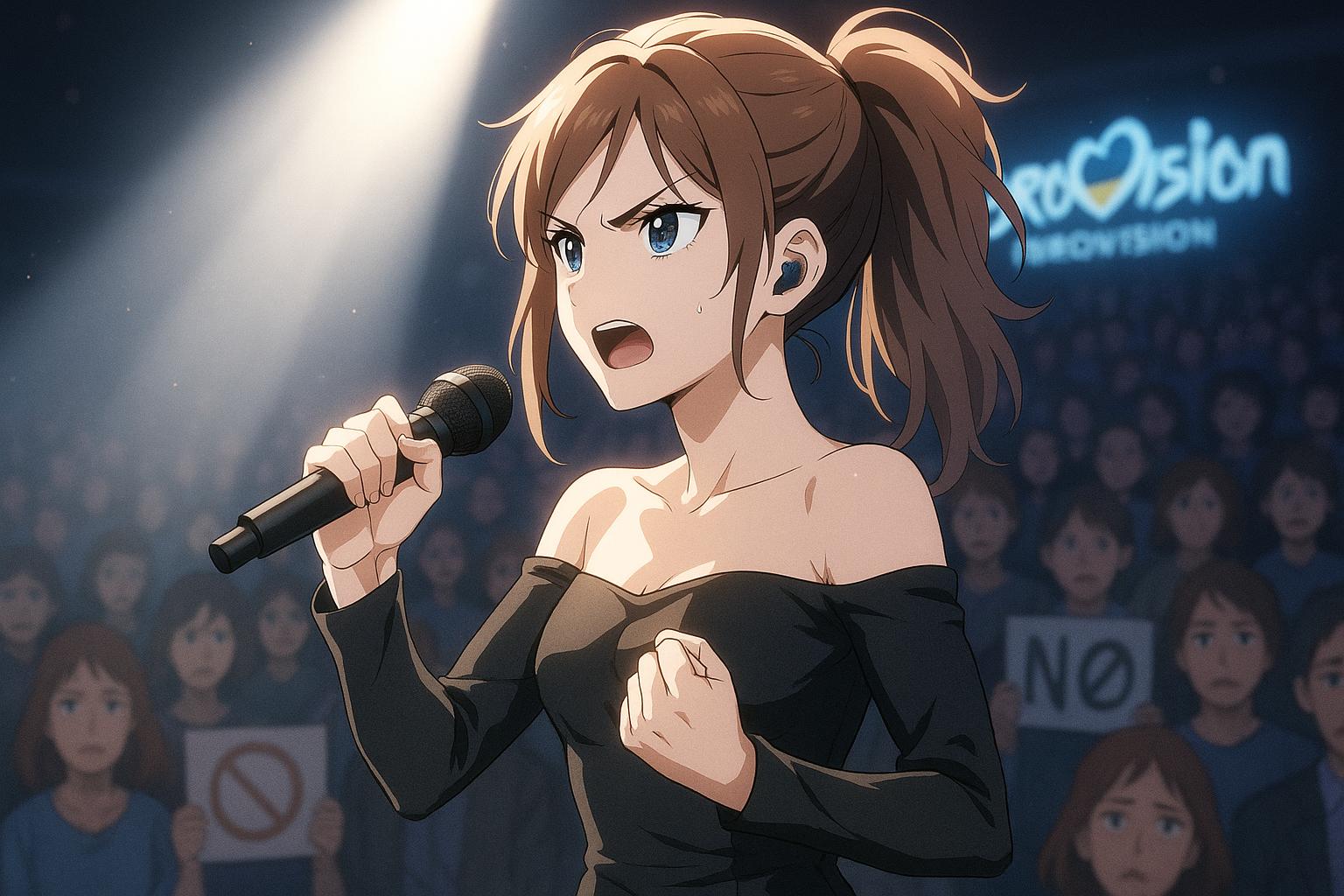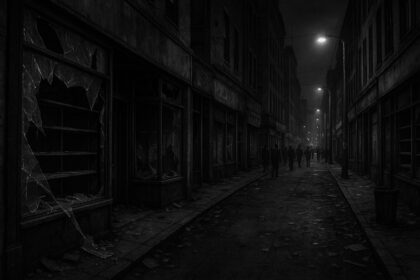Viewers and social media users claim that BBC One’s Eurovision broadcast softened audience boos directed at Israeli contestant Yuval Raphael, sparking debate over censorship as the war in Israel and Palestine casts a shadow over the contest.
Viewers of the Eurovision Song Contest 2025 have voiced significant concerns regarding the perceived censorship of audience reactions during the semi-final featuring Israeli performer Yuval Raphael. Her song, “New Day Will Rise,” was presented in the context of heightened political sensitivities surrounding Israel’s current military conflicts. Despite some reports of audience booing during her performance, the broadcast aired on BBC One seemed to downplay these dissenting reactions, leading many to suspect that the show was edited to filter out discontent.
Social media users shared clips from the event and rehearsal, reinforcing claims that audible booing had been present but was absent from the televised version. One viewer expressed frustration on X (formerly Twitter), suggesting that “Eurovision [was] adding crowd noise over Israel’s performance so viewers can’t hear the booing.” Another echoed this sentiment, claiming that despite efforts to mask the audience’s response, the boos were still overwhelmingly loud.
Officially, the European Broadcasting Union (EBU) has denied the allegations of booing, asserting that no such discontent was noted during the performance and insisting that the atmosphere remained celebratory and positive. However, as tensions between Israel and Palestine escalate, such denials have been met with skepticism. Various human rights organizations have condemned the ongoing violence in the region, which has reportedly resulted in over 52,800 deaths, a significant number of whom are women and children, amidst accusations of genocide.
Raphael, who herself survived the tragic events of October 7, where a Hamas attack left around 1,200 people dead, acknowledged the potential for negative reactions to her appearance. “I am expecting to be booed,” she stated ahead of her performance. Nevertheless, she emphasised her commitment to honouring her craft: “We are here to sing, and I’m going to sing my heart out for everyone.”
Calls to exclude Israel from Eurovision this year gained momentum, with over 70 former contestants signing an open letter demanding that both Israel and its national broadcaster KAN should be banned from the competition. The letter cites broader concerns over Israel’s actions in the region, and the climate surrounding the event has been charged with public protests. In a previous rehearsal, for example, six individuals, some members of the same family, displayed a large Palestinian flag and were subsequently expelled by security personnel. These protests underscore the friction between artistic expression and political commentary at such international gatherings.
Broadcasters affiliated with Eurovision have had to navigate this delicate landscape carefully. RTVE commentators at the event highlighted the ethical dilemmas at play, noting that the Spanish broadcaster had requested a debate about Israel’s participation due to concerns surrounding the humanitarian crisis in Gaza. Commentators raised awareness about the significant loss of life, framing their remarks as a call for peace and justice rather than an indictment of any nation.
As the Grand Final approaches, taking place on May 17, the stakes continue to heighten. Organisers are caught in the challenging position of maintaining the contest’s apolitical ethos while acknowledging the controversies that inevitably surface as a result of the current geopolitical climate. With protests anticipated to continue and strong feelings on both sides of the issue, the Eurovision Song Contest will undoubtedly find itself at the intersection of music, politics, and public sentiment.
Moving forward, the implications of these events extend far beyond the competition itself. They confront attendees and viewers alike with difficult questions about the role of culture during periods of conflict and how international platforms navigate expression in such charged environments.
Reference Map
Source: Noah Wire Services
- https://www.independent.co.uk/arts-entertainment/music/news/eurovision-israel-booing-boos-censored-b2751925.html – Please view link – unable to able to access data
- https://www.independent.co.uk/arts-entertainment/music/news/eurovision-israel-booing-boos-censored-b2751925.html – This article discusses the controversy surrounding Israel’s participation in the Eurovision 2025 semi-final, where singer Yuval Raphael performed ‘New Day Will Rise.’ Viewers accused the broadcast of censoring audience boos during her performance. Despite claims of booing, the European Broadcasting Union (EBU) stated they heard no boos and maintained a positive atmosphere throughout the event. The article also highlights the ongoing conflict in Gaza and the calls for Israel’s exclusion from the competition.
- https://www.huffingtonpost.es/life/seis-espectadores-expulsados-abuchear-israel-ensayo-oficial-eurovision-2025.html – This report details an incident during a Eurovision 2025 rehearsal where six spectators were expelled for booing and whistling during Israel’s representative Yuval Raphael’s performance. The individuals, some from the same family, disrupted the event with a large Palestinian flag and a whistle. The Swiss broadcaster SRG SSR emphasized its commitment to maintaining a neutral and inclusive environment. Raphael, a survivor of the October 2023 Hamas attacks, performed ‘New Day Will Rise,’ a song reflecting on her experiences.
- https://www.huffingtonpost.es/life/los-comentaristas-rtve-en-eurovision-hacen-esta-declaracion-antes-de-la-actuacion-de-israel.html – This article covers the comments made by RTVE commentators Tony Aguilar and Julia Varela during the second semifinal of Eurovision 2025. They addressed the controversy surrounding Israel’s participation, noting that RTVE had requested the European Broadcasting Union (EBU) to debate Israel’s eligibility due to concerns over the Gaza conflict. Aguilar mentioned the high number of victims in Gaza, while Varela emphasized that the petition was a call for peace, justice, and human rights, not against any country.
- https://elpais.com/television/2025-05-15/israel-llega-este-jueves-a-eurovision-ante-las-protestas-de-agrupaciones-suizas.html – This article reports on the protests by Swiss citizen groups against Israel’s participation in Eurovision 2025 in Basel. Organizations like Basel for Palestine and ESC.alate4Palestine criticized the European Broadcasting Union (EBU) for legitimizing Israel despite alleged violations of international law in Gaza. The protests, though smaller than the previous year in Malmö, intensified in Basel, leading to the prohibition of a usual vigil due to festival-related activities. The article also mentions the expulsion of protesters during Raphael’s rehearsal.
- https://apnews.com/article/44e0c8fd8d3b4240c5928aaea6bf64c4 – This article provides an overview of the Eurovision 2025 semifinal held in Basel, Switzerland, where six of the 16 competing acts were eliminated. Israel’s Yuval Raphael advanced to the final with her song ‘New Day Will Rise.’ The article also touches upon the ongoing controversy over Israel’s participation, noting protests in Basel and disruptions during Raphael’s rehearsal. Despite the tensions, the European Broadcasting Union (EBU) allowed Israel to compete, maintaining the event’s apolitical stance.
- https://www.jta.org/2025/03/09/israel/darkness-will-fade-yuval-raphael-sings-in-israels-eurovision-entry-new-day-will-rise – This article discusses Israel’s Eurovision 2025 entry, ‘New Day Will Rise,’ performed by Yuval Raphael, a survivor of the October 2023 Hamas attacks. The song conveys themes of hope and resilience, with lyrics like ‘Darkness will fade, all the pain will go by.’ The music video features Raphael singing in a field of red anemones, Israel’s national flower, and includes a verse quoting from Jewish scripture. The article also notes that the European Broadcasting Union (EBU) approved the song, emphasizing the contest’s apolitical nature.
Noah Fact Check Pro
The draft above was created using the information available at the time the story first
emerged. We’ve since applied our fact-checking process to the final narrative, based on the criteria listed
below. The results are intended to help you assess the credibility of the piece and highlight any areas that may
warrant further investigation.
Freshness check
Score:
10
Notes:
The information appears to be very recent, focusing on the 2025 Eurovision Song Contest and current geopolitical events.
Quotes check
Score:
8
Notes:
The narrative includes direct quotes from Yuval Raphael, but no specific original source is mentioned. The quotes align with the context of her expectations and commitment to her performance.
Source reliability
Score:
8
Notes:
The narrative originates from The Independent, a reputable news publication known for its fact-based reporting. However, the nature of the topic inherently involves subjective perspectives and potential biases.
Plausability check
Score:
9
Notes:
The claims are plausible given the geopolitical tensions and the known protests surrounding Israel’s participation in Eurovision. However, the allegations of censorship are controversial and require further evidence to confirm.
Overall assessment
Verdict (FAIL, OPEN, PASS): OPEN
Confidence (LOW, MEDIUM, HIGH): MEDIUM
Summary:
The narrative discusses recent and sensitive topics, with reliable sources but potential for subjective interpretation. The claims of censorship are plausible given the context but require further verification. The high score reflects the freshness and reliability of the source, while the medium confidence reflects the ongoing nature of the event and potential for differing perspectives.













